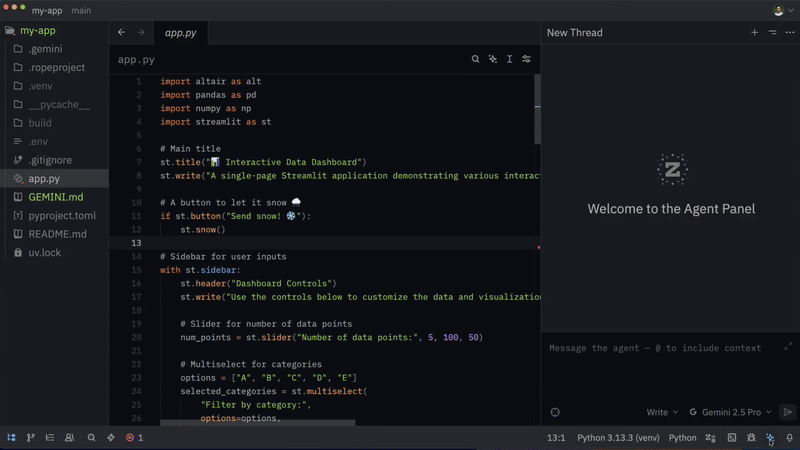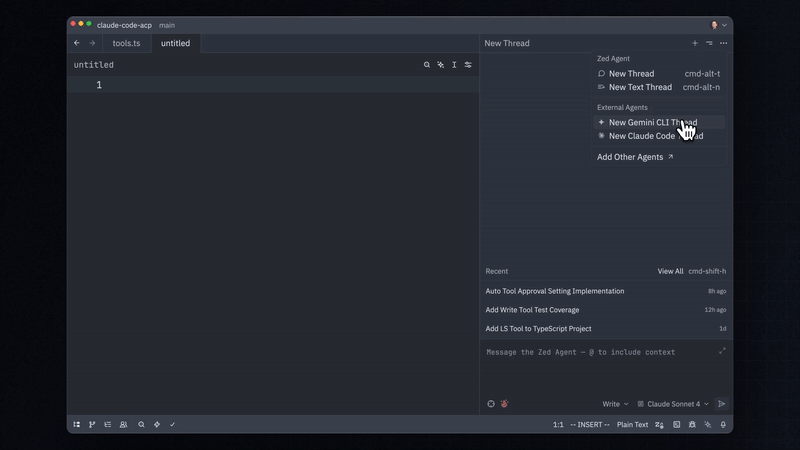
10 Sept 20258 minute read

10 Sept 20258 minute read

AI coding agents are everywhere, allowing developers to generate code, refactor functions, or explain complex logic. However, today’s agents are fragmented — each editor or IDE needs its own custom integration, forcing ecosystems to reinvent the same integration in their own way.
Want to use Claude Code inside JetBrains? Well, JetBrains would have to build and maintain that integration. How about inside Neovim? Then the community has to step up.
The same work, repeated.
And this is why the folks at Zed created the Agent Client Protocol (ACP), an open standard that lets any editor or IDE connect seamlessly to any AI agent. With ACP, you can switch from refactoring with Claude to testing with Gemini without juggling multiple terminals and re-explaining your project each time.
Zed, for the uninitiated, is an open source code editor developed by Zed Industries, the same team behind Atom, GitHub’s discontinued code editor. Zed runs on a Rust core, sports built-in collaboration features, and keeps a lightweight footprint compared to traditional IDEs.
Up until now, Zed integrated AI through its own custom Agent Panel, which let developers call on models like Claude or Gemini from within the editor. That approach worked, but it was unique to Zed. With the launch of ACP, that system becomes interoperable: any IDE or editor that implements ACP can connect to agents like Claude Code or Gemini CLI, without needing a bespoke integration for each.
Zed CEO and co-founder Nathan Sobo said that the goal with ACP is to break down integration silos in the same way past standards did for language tooling.
“Because software developers rely on diverse tools in a variety of different tech stacks, we see room for multiple agents competing to solve problems in different domains,” Sobo said. “Just as the Language Server Protocol (LSP) unbundled language intelligence from monolithic IDEs, our goal with the Agent Client Protocol is to enable you to switch between multiple agents without switching your editor.”
Available on GitHub under an Apache 2.0 license, ACP also builds on other recent efforts to bring standardization to the agentic coding realm. In late 2024, Anthropic launched the Model Context Protocol (MCP) to standardize how models access tools and external data. Meanwhile, Agents.md looks set to become the de facto standard for instructing AI coding agents, regardless of their environment.
But a standard only matters if it’s adopted in the real world, and to that end, Zed has already secured some fairly big inaugural integrations.
First out of the gate was Gemini CLI from Google, which is now available directly inside Zed via ACP.
From Google’s perspective, it makes perfect sense to push Gemini CLI through the developer ecosystem. At its launch back in July, Google pitched the tool as a way to bring Gemini into everyday workflows, whether that meant generating code, scaffolding projects, or running quick refactors — all from the terminal.
Inside of Zed, it gains a graphical front end: developers can call on Gemini from the Agent Panel, apply its suggestions across buffers, and review changes inline, without leaving their editor
“The integration marries two essential tools – the terminal and IDE – to help you tackle common tasks with speed and precision,” Ryan J. Salva, a senior director of product management at Google, wrote in a blog post.

In the immediate aftermath of the announcement, the community were keen to let Zed know they wanted support for another popular AI agent – Claude Code.

While Google had collaborated directly with Zed for the integration, getting the Zed editor to support Anthropic's terminal-based tool required a little extra work.
As per the ACP’s official documentation, agents that implement the protocol can plug into any compatible editor, and editors that support ACP can access all ACP-ready agents.
But what if an agent hasn’t implemented ACP? In this case, Zed stepped in, building its own bridge to wrap Claude Code so it could communicate over ACP, even though Anthropic hasn’t officially adopted the standard.
Morgan Krey, Zed’s head of operations, said the Claude Code public beta was less about a quick integration, and more about proving ACP’s broader potential.
“For months, developers have been asking us to bring Claude Code into Zed,” Krey wrote in a blog post. “We didn’t just want to bolt on a one-off integration; we wanted to build something better. ACP is our new open standard that lets any agent connect to Zed (and other editors, too). Claude Code is a perfect example of what’s possible.”

On Hacker News, one user noted that ACP could lower switching costs between AI assistants, forcing providers to compete more directly on quality rather than lock-in.
“The level of competition in the LLM and coding assistant market is always nice to see, and this only helps to make costs of switching between offerings even smaller,” they wrote.
Another user echoed those sentiments, praising Zed for pushing the status quo, likely a nod to incumbents such as VS Code or JetBrains IDEs.
“For years I've prototyped a few different editors because of frustration with the status quo,” they wrote. “There's a lot of work that goes into a good editor, and Zed has definitely done the legwork. I welcome them openly collaborating.”
However, not everyone saw the sunny side. Some argued that Zed can’t yet match the depth of mature IDEs like JetBrains. One said, “you can take IntelliJ out of my cold, dead hands,” citing the lack of advanced features such as intelligent refactoring, integrated debugging, and deep codebase navigation. Another agreed, adding that even basic autocomplete falls short, and configuration quirks make it frustrating to use for languages like Python.
Still, ACP’s open ethos means anyone can wire up their own agents. One Reddit user said that they’d already tested Gemini CLI successfully in Zed, and were now experimenting with both Qwen CLI (a terminal interface for Alibaba’s LLM) and a homegrown Rust-based CLI – a reminder that the standard lowers the barrier for community-driven integrations.